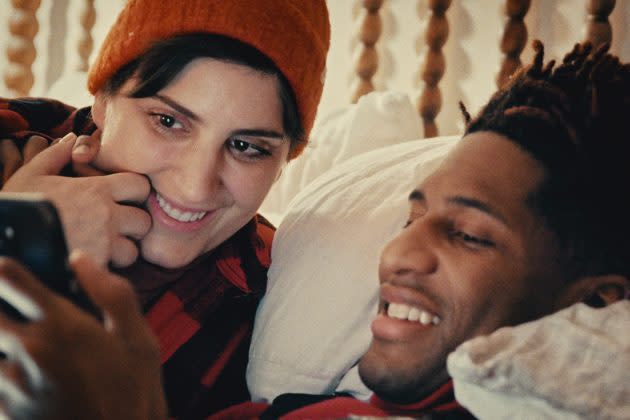‘American Symphony’ Review: Jon Batiste Juggles Music Triumphs and Family Illness in an Intimate Music/Cancer Documentary

“Be kind, because everyone you meet is fighting a great battle” — that popular maxim (or some variation thereof) is often brought up in the context of remembering to have some sympathy for jerks. But it could also be applied to people whose lives seem too charmed to be true. In the documentary “American Symphony,” Jon Batiste, who often comes off as the merriest performer in all of popular music, turns out to be dealing with grim stuff behind the grin. It’s his wife, Suleika Jaouad, who’s waging the real war, against recurring leukemia. But Batiste is having his own skirmishes with anxiety and panic attacks related to her illness, even as he’s making headlines as the surprise Grammy hoarder of 2022. So don’t hate him just because he seems so damn happy, the film suggests; he’s earned his ebullience.
A Batiste doc might have seemed an unlikely next step for director Matthew Heineman, whose previous efforts (which include “Cartel Land” and the Syrian war film “City of Ghosts”) have established him as someone who deals in far tougher stuff than entertainment-world hagiographies. It’s clear that he was drawn to do “American Symphony” because it’s essentially a living-with-cancer drama first and portrait of an artist at work almost secondarily — or at least it’s the only film you’ll see that spends equal amounts of time at Carnegie Hall, where Batiste is seen preparing the neo-classical work that gives the movie its title, and the Memorial Sloan Kettering Cancer Center, where Jaouad is undergoing bone marrow transplant treatment.
More from Variety
Still, you have to wonder if Heineman might have chosen Batiste as a subject just because he was ready to spend that much time in the presence of someone so naturally beatific and beaming, after some of the earlier movies he’s made. Batiste has one of those rare Dolly Parton type of presences, where he seems to have been born to bring light into any room he enters, so even the inclusion of scenes in which he admits how depressed he is to his phone therapist don’t do much to dampen the glow of somebody who doesn’t really seem to have an off switch for his inner light.
Jaouad is a pretty severely inspirational figure herself, if never less than a brutally honest one, so between them, the movie benefits from a surfeit of positive radiation. Their background together as a couple is established in scenes like the discussion with friends and family at a home wedding ceremony: They met as youth at jazz camp, even if her destiny was to become a New York Times columnist and bestselling author focused on cancer writing, rather than a star of the bass and cello. It’s hard to remember a documentary with quite so many cuddling scenes as this one — theirs will certainly feel like an aspirational model for viewers who are dealing with the same challenging stuff and not always having it processed in such a graceful way in their relationships.
The duo seem to have found a way to deal with the everyday ugliness of illness that exists in balance with the blessings, so that Batiste can take a break from symphonic rehearsals to take a phone call from Jaouad about how she woke up with her bed filled with blood, medical ports being imperfect things. Then he hops back to work, rousing dozens of string and horn players he’s just met with the inspirational advice: “It’s gonna sound how it sounds until it sounds how it sounds.” (Someone ought to put that on a plaque.)
To the extent that the movie does leave Jaouad behind at times to focus just on Batiste’s career, it’s illuminating. And somehow knowing that we’ll come back to the cancer moderates how much a doc just about him could devolve into journeyman-hero worship. “American Symphony” does get into some of the far lesser battles Batiste is facing, like resentment from the classical world that a “pop star” is invading their domain. He has a nearly childlike enthusiasm for music that extends to other areas of life, as well; when a snowstorm hits New York and Jaouad takes him to the park, no 7-year-old has ever been more excited about sledding for the first time than Batiste is. Maybe the funniest bit in the movie is when he visits his alma mater, Juilliard, and sees they’ve put up a photo of him playing one of his favorite instruments, the melodica (a sort of mouth keyboard), which he says the school at the time considered a “child’s toy,” to the extent that they sent him to a psychiatrist. His ultimate triumph on the melodica matter lets a little hubris shine through the humility.
Aside from having a performance of the symphony as a climax, “American Symphony” doesn’t really have an ending. For this warm and lovely film’s most natural audience, which will most likely be families struggling with illness, the documentary’s final inconclusiveness may feel like a feature, not a flaw: Music is forever, and so is chemo, in some cases. Holding those elements in balance is one way to create a symphony.
Best of Variety
Sign up for Variety’s Newsletter. For the latest news, follow us on Facebook, Twitter, and Instagram.

 Yahoo News
Yahoo News 